Management Accounting for Sustainable Business Growth: A Report
VerifiedAdded on 2023/06/08
|14
|4958
|151
Report
AI Summary
This report provides a comprehensive overview of management accounting, encompassing its core principles, systems, and techniques. It delves into the role of management accounting in decision-making, emphasizing its importance in identifying, analyzing, and interpreting financial information for internal use. The report is divided into two parts, the first focusing on fundamental concepts such as management by exception, control at source, and the finance for inflation principles. The second part examines effective planning tools, cost analysis, and inventory management. It also explores how financial reporting and statements contribute to business success. The report concludes with recommendations for Unilever, highlighting the benefits of management accounting in achieving sustainable growth through effective planning, controlling, coordinating, and asset protection.
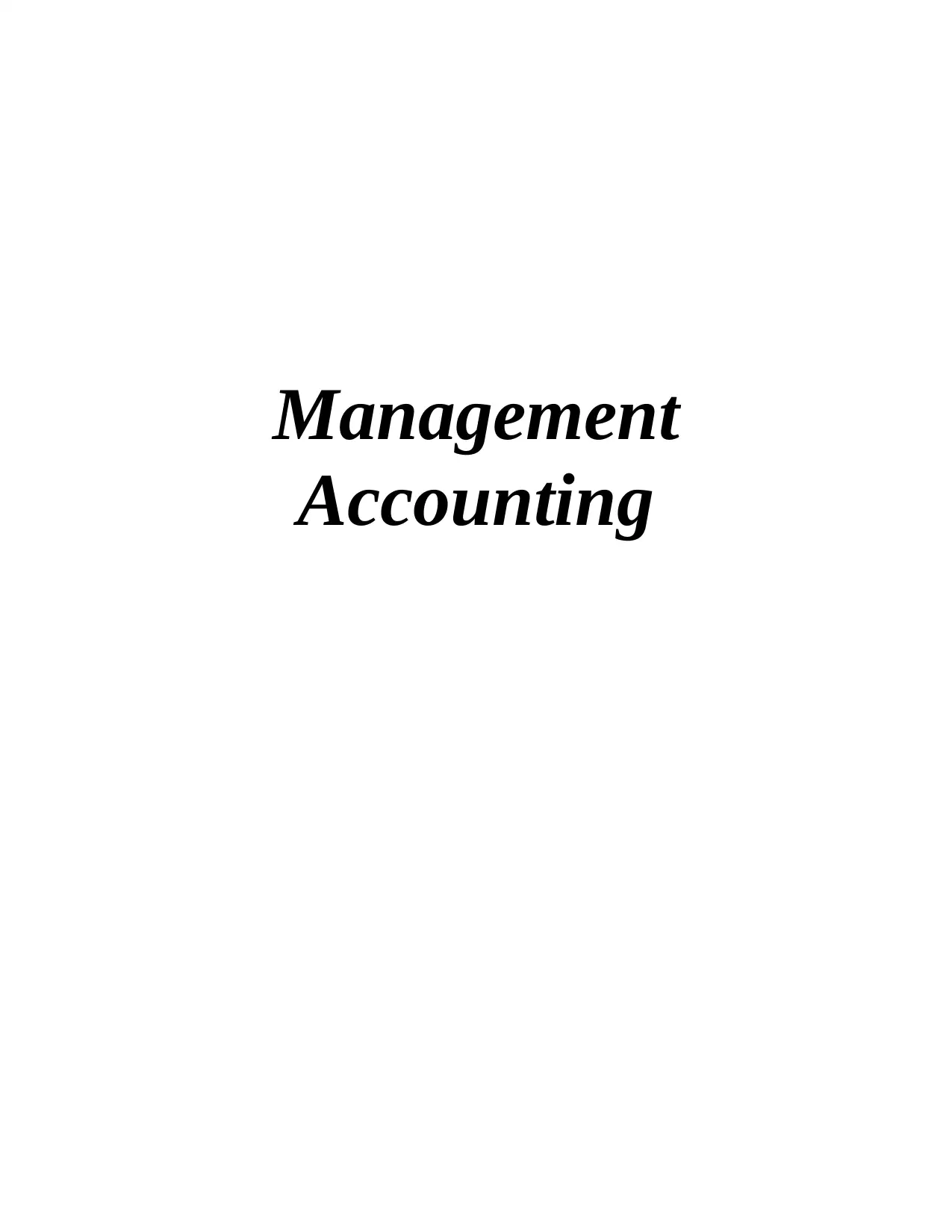
Management
Accounting
Accounting
Paraphrase This Document
Need a fresh take? Get an instant paraphrase of this document with our AI Paraphraser
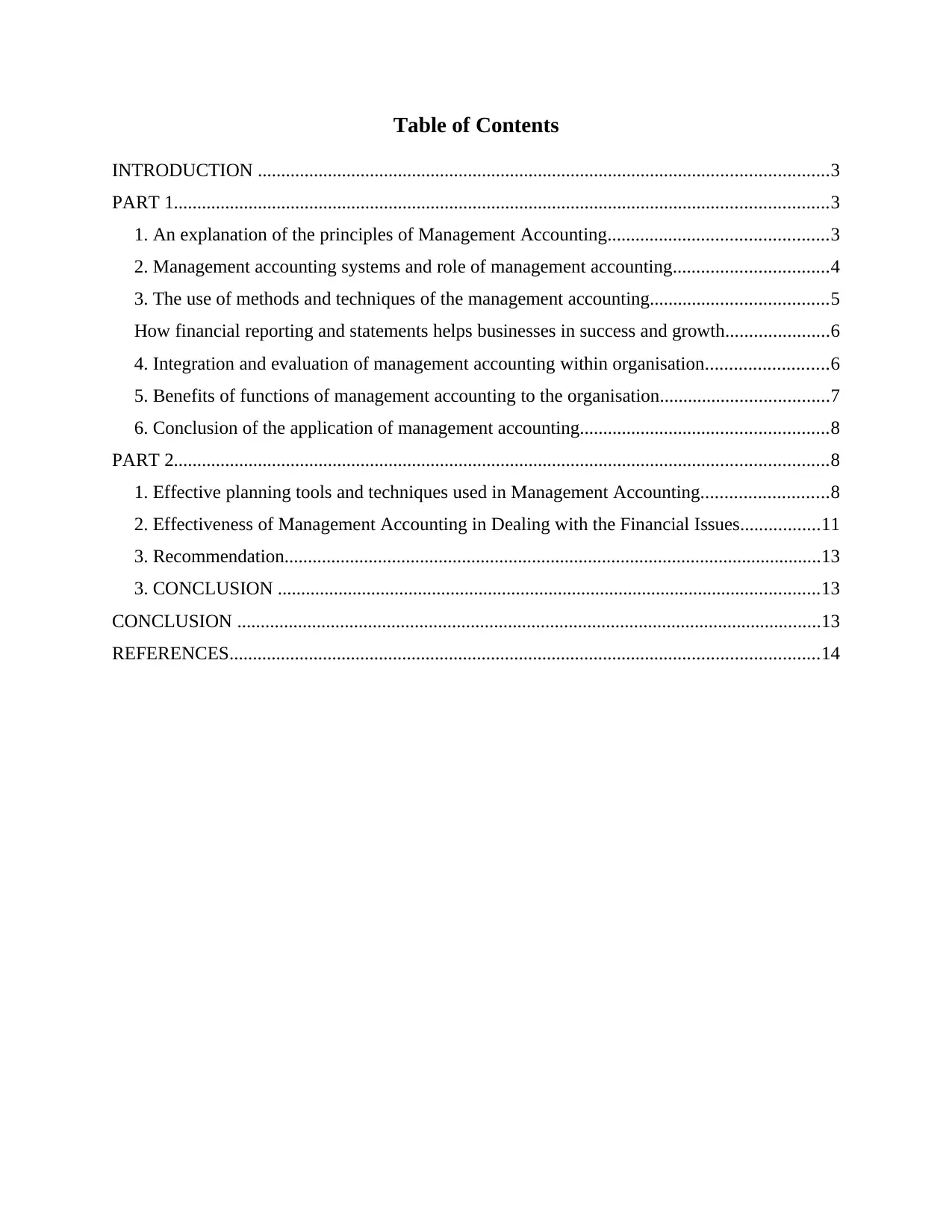
Table of Contents
INTRODUCTION ..........................................................................................................................3
PART 1............................................................................................................................................3
1. An explanation of the principles of Management Accounting...............................................3
2. Management accounting systems and role of management accounting.................................4
3. The use of methods and techniques of the management accounting......................................5
How financial reporting and statements helps businesses in success and growth......................6
4. Integration and evaluation of management accounting within organisation..........................6
5. Benefits of functions of management accounting to the organisation....................................7
6. Conclusion of the application of management accounting.....................................................8
PART 2............................................................................................................................................8
1. Effective planning tools and techniques used in Management Accounting...........................8
2. Effectiveness of Management Accounting in Dealing with the Financial Issues.................11
3. Recommendation...................................................................................................................13
3. CONCLUSION ....................................................................................................................13
CONCLUSION .............................................................................................................................13
REFERENCES..............................................................................................................................14
INTRODUCTION ..........................................................................................................................3
PART 1............................................................................................................................................3
1. An explanation of the principles of Management Accounting...............................................3
2. Management accounting systems and role of management accounting.................................4
3. The use of methods and techniques of the management accounting......................................5
How financial reporting and statements helps businesses in success and growth......................6
4. Integration and evaluation of management accounting within organisation..........................6
5. Benefits of functions of management accounting to the organisation....................................7
6. Conclusion of the application of management accounting.....................................................8
PART 2............................................................................................................................................8
1. Effective planning tools and techniques used in Management Accounting...........................8
2. Effectiveness of Management Accounting in Dealing with the Financial Issues.................11
3. Recommendation...................................................................................................................13
3. CONCLUSION ....................................................................................................................13
CONCLUSION .............................................................................................................................13
REFERENCES..............................................................................................................................14
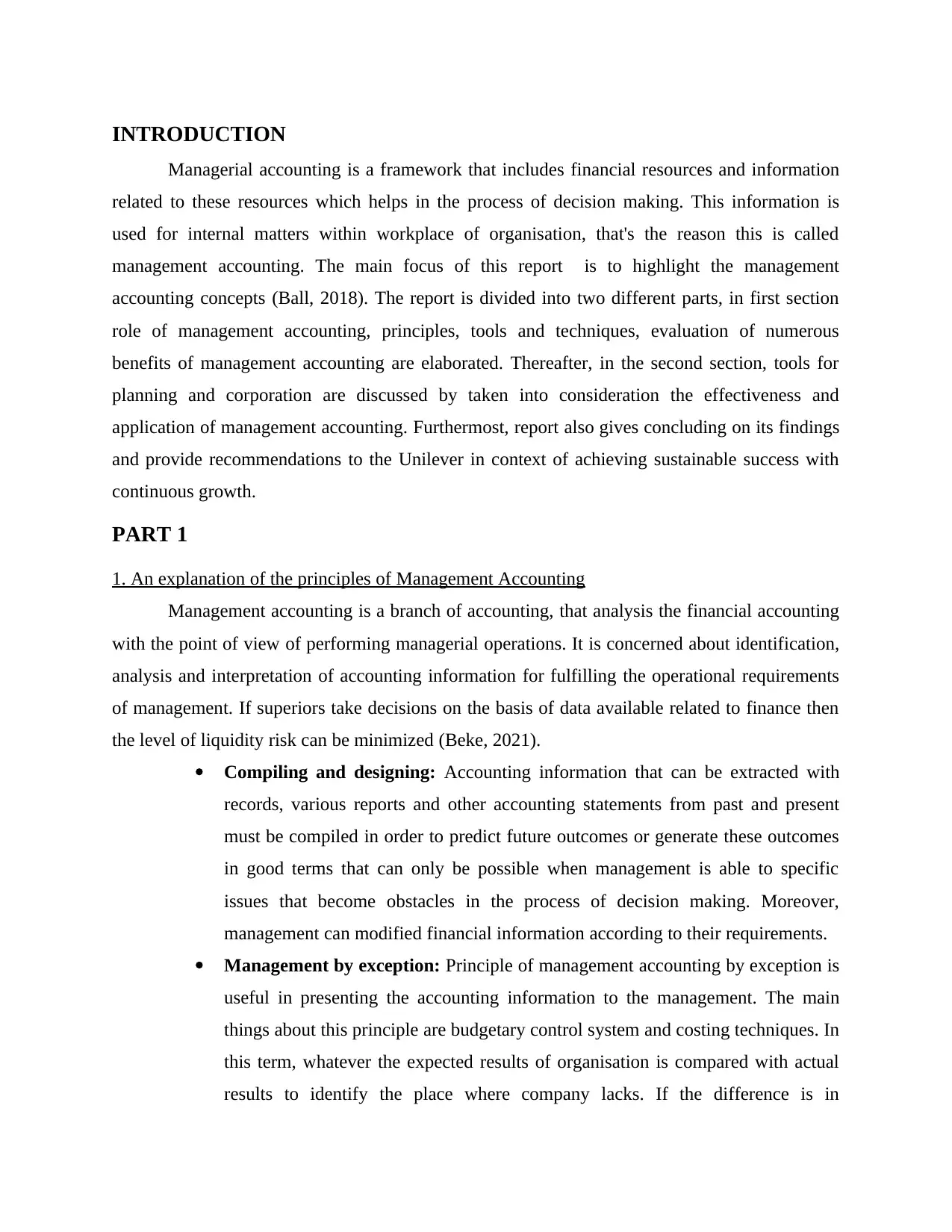
INTRODUCTION
Managerial accounting is a framework that includes financial resources and information
related to these resources which helps in the process of decision making. This information is
used for internal matters within workplace of organisation, that's the reason this is called
management accounting. The main focus of this report is to highlight the management
accounting concepts (Ball, 2018). The report is divided into two different parts, in first section
role of management accounting, principles, tools and techniques, evaluation of numerous
benefits of management accounting are elaborated. Thereafter, in the second section, tools for
planning and corporation are discussed by taken into consideration the effectiveness and
application of management accounting. Furthermost, report also gives concluding on its findings
and provide recommendations to the Unilever in context of achieving sustainable success with
continuous growth.
PART 1
1. An explanation of the principles of Management Accounting
Management accounting is a branch of accounting, that analysis the financial accounting
with the point of view of performing managerial operations. It is concerned about identification,
analysis and interpretation of accounting information for fulfilling the operational requirements
of management. If superiors take decisions on the basis of data available related to finance then
the level of liquidity risk can be minimized (Beke, 2021).
Compiling and designing: Accounting information that can be extracted with
records, various reports and other accounting statements from past and present
must be compiled in order to predict future outcomes or generate these outcomes
in good terms that can only be possible when management is able to specific
issues that become obstacles in the process of decision making. Moreover,
management can modified financial information according to their requirements.
Management by exception: Principle of management accounting by exception is
useful in presenting the accounting information to the management. The main
things about this principle are budgetary control system and costing techniques. In
this term, whatever the expected results of organisation is compared with actual
results to identify the place where company lacks. If the difference is in
Managerial accounting is a framework that includes financial resources and information
related to these resources which helps in the process of decision making. This information is
used for internal matters within workplace of organisation, that's the reason this is called
management accounting. The main focus of this report is to highlight the management
accounting concepts (Ball, 2018). The report is divided into two different parts, in first section
role of management accounting, principles, tools and techniques, evaluation of numerous
benefits of management accounting are elaborated. Thereafter, in the second section, tools for
planning and corporation are discussed by taken into consideration the effectiveness and
application of management accounting. Furthermost, report also gives concluding on its findings
and provide recommendations to the Unilever in context of achieving sustainable success with
continuous growth.
PART 1
1. An explanation of the principles of Management Accounting
Management accounting is a branch of accounting, that analysis the financial accounting
with the point of view of performing managerial operations. It is concerned about identification,
analysis and interpretation of accounting information for fulfilling the operational requirements
of management. If superiors take decisions on the basis of data available related to finance then
the level of liquidity risk can be minimized (Beke, 2021).
Compiling and designing: Accounting information that can be extracted with
records, various reports and other accounting statements from past and present
must be compiled in order to predict future outcomes or generate these outcomes
in good terms that can only be possible when management is able to specific
issues that become obstacles in the process of decision making. Moreover,
management can modified financial information according to their requirements.
Management by exception: Principle of management accounting by exception is
useful in presenting the accounting information to the management. The main
things about this principle are budgetary control system and costing techniques. In
this term, whatever the expected results of organisation is compared with actual
results to identify the place where company lacks. If the difference is in
⊘ This is a preview!⊘
Do you want full access?
Subscribe today to unlock all pages.

Trusted by 1+ million students worldwide
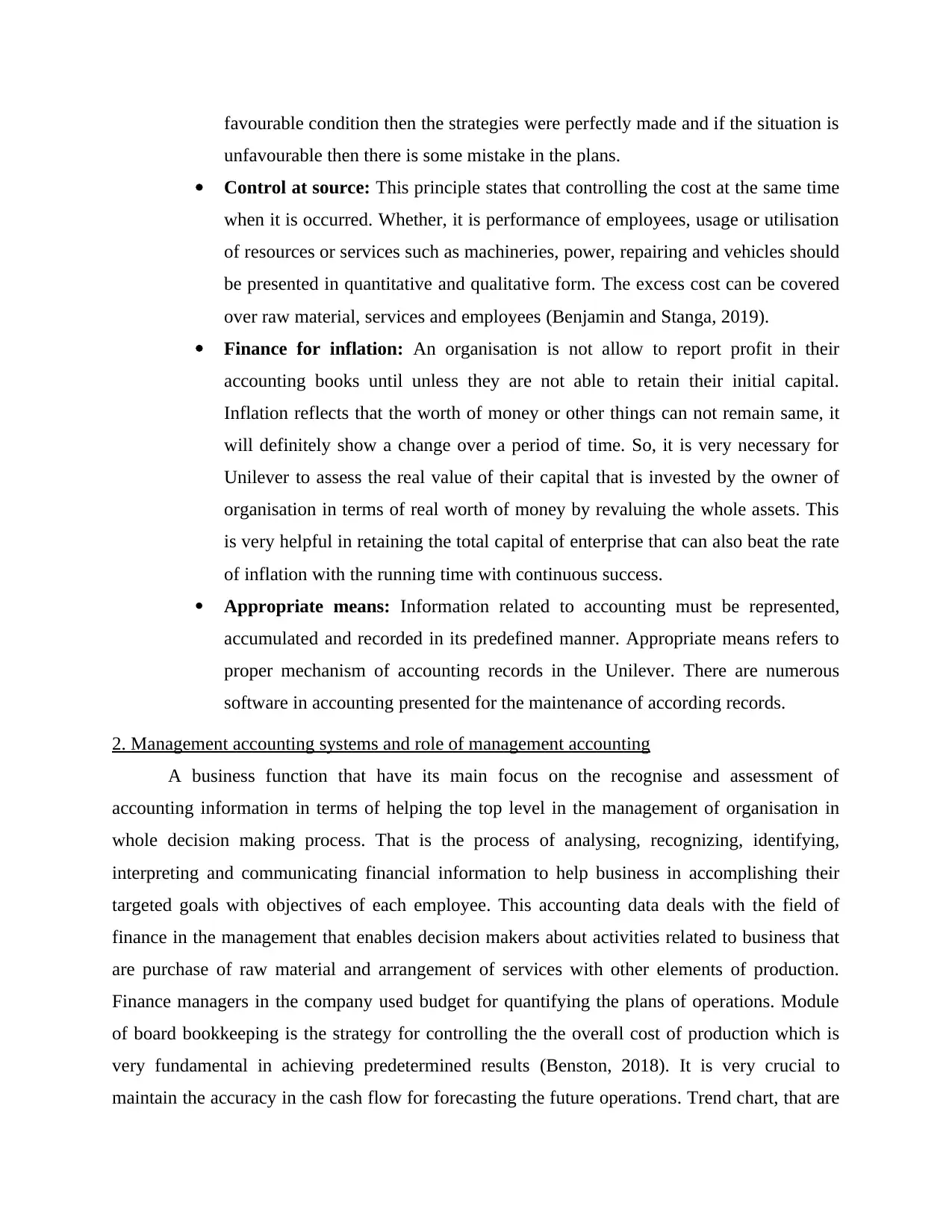
favourable condition then the strategies were perfectly made and if the situation is
unfavourable then there is some mistake in the plans.
Control at source: This principle states that controlling the cost at the same time
when it is occurred. Whether, it is performance of employees, usage or utilisation
of resources or services such as machineries, power, repairing and vehicles should
be presented in quantitative and qualitative form. The excess cost can be covered
over raw material, services and employees (Benjamin and Stanga, 2019).
Finance for inflation: An organisation is not allow to report profit in their
accounting books until unless they are not able to retain their initial capital.
Inflation reflects that the worth of money or other things can not remain same, it
will definitely show a change over a period of time. So, it is very necessary for
Unilever to assess the real value of their capital that is invested by the owner of
organisation in terms of real worth of money by revaluing the whole assets. This
is very helpful in retaining the total capital of enterprise that can also beat the rate
of inflation with the running time with continuous success.
Appropriate means: Information related to accounting must be represented,
accumulated and recorded in its predefined manner. Appropriate means refers to
proper mechanism of accounting records in the Unilever. There are numerous
software in accounting presented for the maintenance of according records.
2. Management accounting systems and role of management accounting
A business function that have its main focus on the recognise and assessment of
accounting information in terms of helping the top level in the management of organisation in
whole decision making process. That is the process of analysing, recognizing, identifying,
interpreting and communicating financial information to help business in accomplishing their
targeted goals with objectives of each employee. This accounting data deals with the field of
finance in the management that enables decision makers about activities related to business that
are purchase of raw material and arrangement of services with other elements of production.
Finance managers in the company used budget for quantifying the plans of operations. Module
of board bookkeeping is the strategy for controlling the the overall cost of production which is
very fundamental in achieving predetermined results (Benston, 2018). It is very crucial to
maintain the accuracy in the cash flow for forecasting the future operations. Trend chart, that are
unfavourable then there is some mistake in the plans.
Control at source: This principle states that controlling the cost at the same time
when it is occurred. Whether, it is performance of employees, usage or utilisation
of resources or services such as machineries, power, repairing and vehicles should
be presented in quantitative and qualitative form. The excess cost can be covered
over raw material, services and employees (Benjamin and Stanga, 2019).
Finance for inflation: An organisation is not allow to report profit in their
accounting books until unless they are not able to retain their initial capital.
Inflation reflects that the worth of money or other things can not remain same, it
will definitely show a change over a period of time. So, it is very necessary for
Unilever to assess the real value of their capital that is invested by the owner of
organisation in terms of real worth of money by revaluing the whole assets. This
is very helpful in retaining the total capital of enterprise that can also beat the rate
of inflation with the running time with continuous success.
Appropriate means: Information related to accounting must be represented,
accumulated and recorded in its predefined manner. Appropriate means refers to
proper mechanism of accounting records in the Unilever. There are numerous
software in accounting presented for the maintenance of according records.
2. Management accounting systems and role of management accounting
A business function that have its main focus on the recognise and assessment of
accounting information in terms of helping the top level in the management of organisation in
whole decision making process. That is the process of analysing, recognizing, identifying,
interpreting and communicating financial information to help business in accomplishing their
targeted goals with objectives of each employee. This accounting data deals with the field of
finance in the management that enables decision makers about activities related to business that
are purchase of raw material and arrangement of services with other elements of production.
Finance managers in the company used budget for quantifying the plans of operations. Module
of board bookkeeping is the strategy for controlling the the overall cost of production which is
very fundamental in achieving predetermined results (Benston, 2018). It is very crucial to
maintain the accuracy in the cash flow for forecasting the future operations. Trend chart, that are
Paraphrase This Document
Need a fresh take? Get an instant paraphrase of this document with our AI Paraphraser
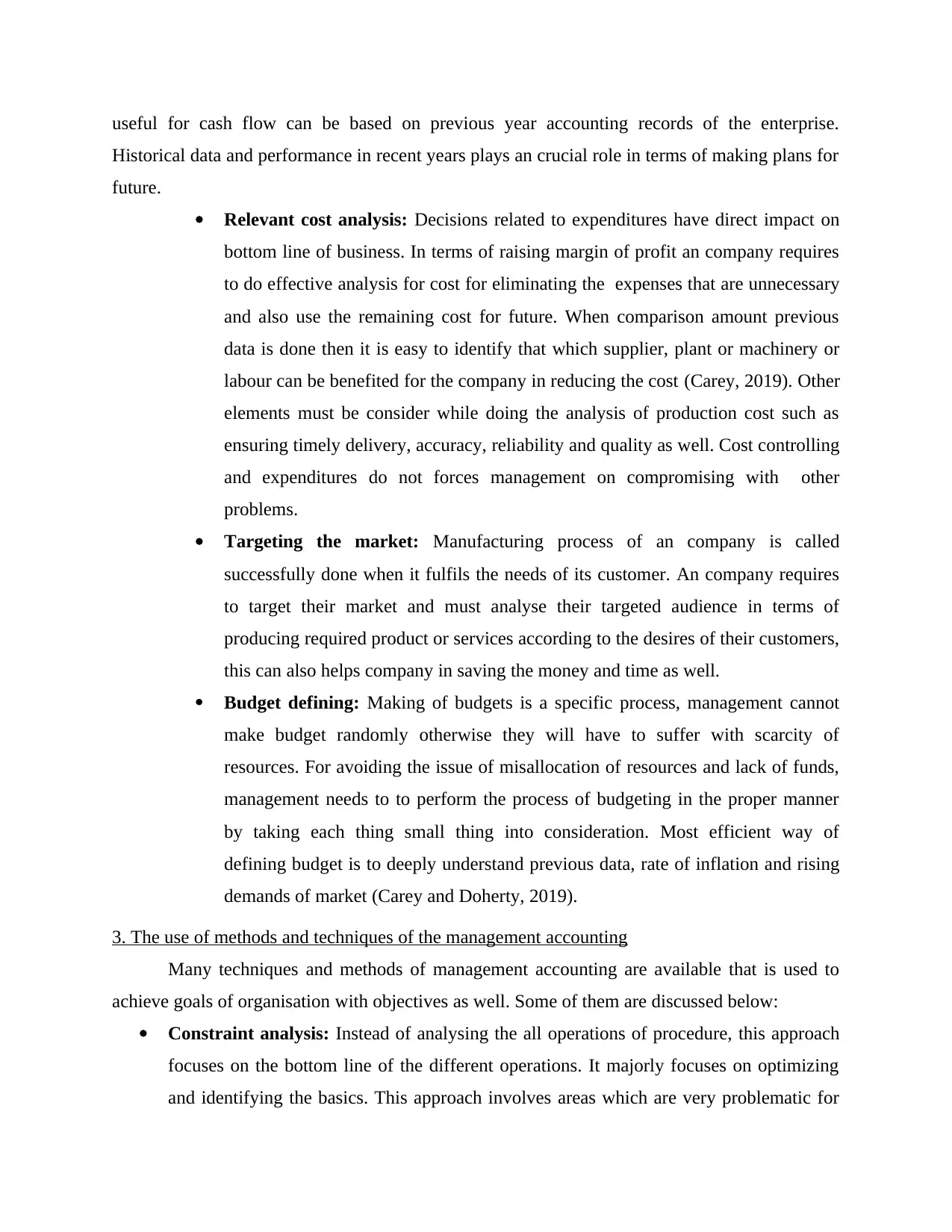
useful for cash flow can be based on previous year accounting records of the enterprise.
Historical data and performance in recent years plays an crucial role in terms of making plans for
future.
Relevant cost analysis: Decisions related to expenditures have direct impact on
bottom line of business. In terms of raising margin of profit an company requires
to do effective analysis for cost for eliminating the expenses that are unnecessary
and also use the remaining cost for future. When comparison amount previous
data is done then it is easy to identify that which supplier, plant or machinery or
labour can be benefited for the company in reducing the cost (Carey, 2019). Other
elements must be consider while doing the analysis of production cost such as
ensuring timely delivery, accuracy, reliability and quality as well. Cost controlling
and expenditures do not forces management on compromising with other
problems.
Targeting the market: Manufacturing process of an company is called
successfully done when it fulfils the needs of its customer. An company requires
to target their market and must analyse their targeted audience in terms of
producing required product or services according to the desires of their customers,
this can also helps company in saving the money and time as well.
Budget defining: Making of budgets is a specific process, management cannot
make budget randomly otherwise they will have to suffer with scarcity of
resources. For avoiding the issue of misallocation of resources and lack of funds,
management needs to to perform the process of budgeting in the proper manner
by taking each thing small thing into consideration. Most efficient way of
defining budget is to deeply understand previous data, rate of inflation and rising
demands of market (Carey and Doherty, 2019).
3. The use of methods and techniques of the management accounting
Many techniques and methods of management accounting are available that is used to
achieve goals of organisation with objectives as well. Some of them are discussed below:
Constraint analysis: Instead of analysing the all operations of procedure, this approach
focuses on the bottom line of the different operations. It majorly focuses on optimizing
and identifying the basics. This approach involves areas which are very problematic for
Historical data and performance in recent years plays an crucial role in terms of making plans for
future.
Relevant cost analysis: Decisions related to expenditures have direct impact on
bottom line of business. In terms of raising margin of profit an company requires
to do effective analysis for cost for eliminating the expenses that are unnecessary
and also use the remaining cost for future. When comparison amount previous
data is done then it is easy to identify that which supplier, plant or machinery or
labour can be benefited for the company in reducing the cost (Carey, 2019). Other
elements must be consider while doing the analysis of production cost such as
ensuring timely delivery, accuracy, reliability and quality as well. Cost controlling
and expenditures do not forces management on compromising with other
problems.
Targeting the market: Manufacturing process of an company is called
successfully done when it fulfils the needs of its customer. An company requires
to target their market and must analyse their targeted audience in terms of
producing required product or services according to the desires of their customers,
this can also helps company in saving the money and time as well.
Budget defining: Making of budgets is a specific process, management cannot
make budget randomly otherwise they will have to suffer with scarcity of
resources. For avoiding the issue of misallocation of resources and lack of funds,
management needs to to perform the process of budgeting in the proper manner
by taking each thing small thing into consideration. Most efficient way of
defining budget is to deeply understand previous data, rate of inflation and rising
demands of market (Carey and Doherty, 2019).
3. The use of methods and techniques of the management accounting
Many techniques and methods of management accounting are available that is used to
achieve goals of organisation with objectives as well. Some of them are discussed below:
Constraint analysis: Instead of analysing the all operations of procedure, this approach
focuses on the bottom line of the different operations. It majorly focuses on optimizing
and identifying the basics. This approach involves areas which are very problematic for
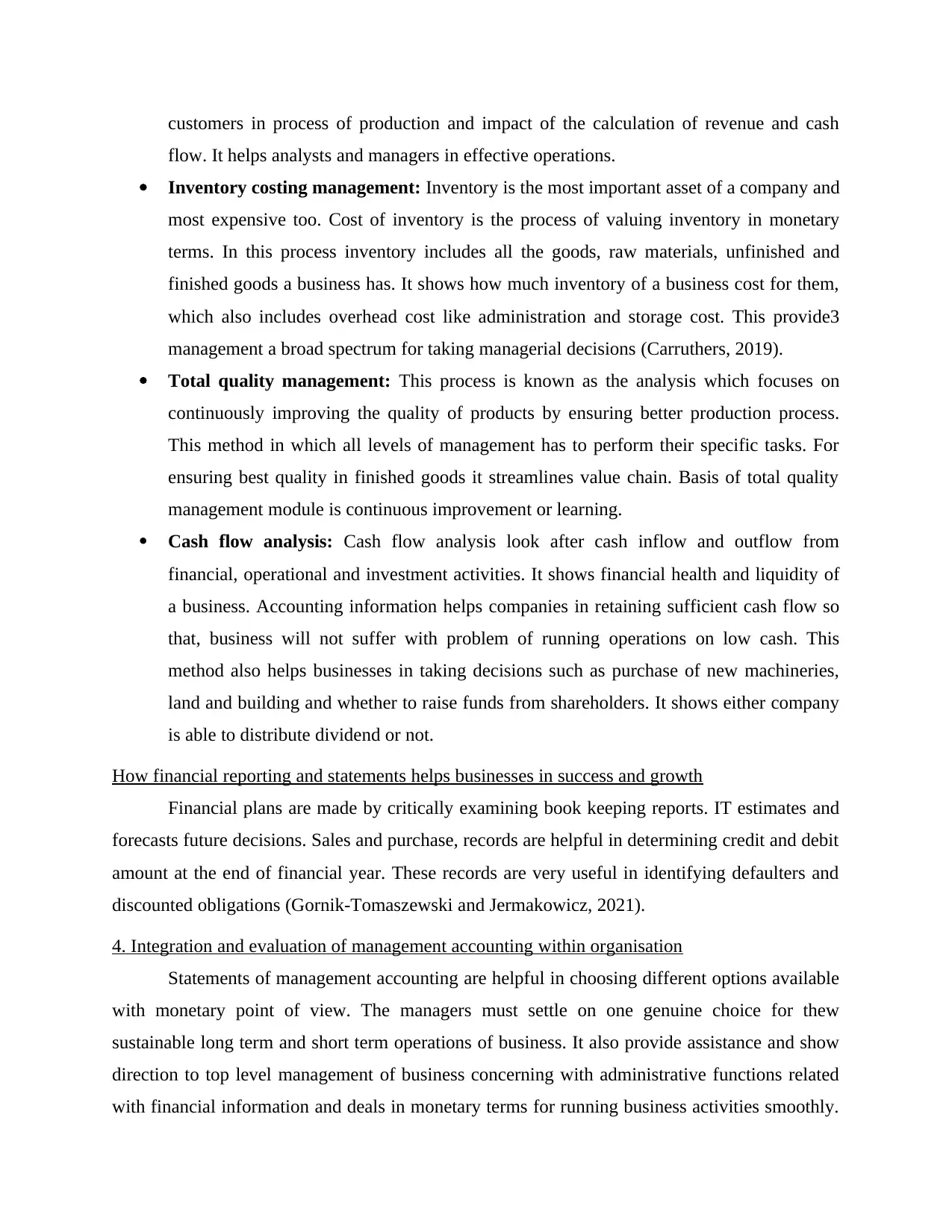
customers in process of production and impact of the calculation of revenue and cash
flow. It helps analysts and managers in effective operations.
Inventory costing management: Inventory is the most important asset of a company and
most expensive too. Cost of inventory is the process of valuing inventory in monetary
terms. In this process inventory includes all the goods, raw materials, unfinished and
finished goods a business has. It shows how much inventory of a business cost for them,
which also includes overhead cost like administration and storage cost. This provide3
management a broad spectrum for taking managerial decisions (Carruthers, 2019).
Total quality management: This process is known as the analysis which focuses on
continuously improving the quality of products by ensuring better production process.
This method in which all levels of management has to perform their specific tasks. For
ensuring best quality in finished goods it streamlines value chain. Basis of total quality
management module is continuous improvement or learning.
Cash flow analysis: Cash flow analysis look after cash inflow and outflow from
financial, operational and investment activities. It shows financial health and liquidity of
a business. Accounting information helps companies in retaining sufficient cash flow so
that, business will not suffer with problem of running operations on low cash. This
method also helps businesses in taking decisions such as purchase of new machineries,
land and building and whether to raise funds from shareholders. It shows either company
is able to distribute dividend or not.
How financial reporting and statements helps businesses in success and growth
Financial plans are made by critically examining book keeping reports. IT estimates and
forecasts future decisions. Sales and purchase, records are helpful in determining credit and debit
amount at the end of financial year. These records are very useful in identifying defaulters and
discounted obligations (Gornik‐Tomaszewski and Jermakowicz, 2021).
4. Integration and evaluation of management accounting within organisation
Statements of management accounting are helpful in choosing different options available
with monetary point of view. The managers must settle on one genuine choice for thew
sustainable long term and short term operations of business. It also provide assistance and show
direction to top level management of business concerning with administrative functions related
with financial information and deals in monetary terms for running business activities smoothly.
flow. It helps analysts and managers in effective operations.
Inventory costing management: Inventory is the most important asset of a company and
most expensive too. Cost of inventory is the process of valuing inventory in monetary
terms. In this process inventory includes all the goods, raw materials, unfinished and
finished goods a business has. It shows how much inventory of a business cost for them,
which also includes overhead cost like administration and storage cost. This provide3
management a broad spectrum for taking managerial decisions (Carruthers, 2019).
Total quality management: This process is known as the analysis which focuses on
continuously improving the quality of products by ensuring better production process.
This method in which all levels of management has to perform their specific tasks. For
ensuring best quality in finished goods it streamlines value chain. Basis of total quality
management module is continuous improvement or learning.
Cash flow analysis: Cash flow analysis look after cash inflow and outflow from
financial, operational and investment activities. It shows financial health and liquidity of
a business. Accounting information helps companies in retaining sufficient cash flow so
that, business will not suffer with problem of running operations on low cash. This
method also helps businesses in taking decisions such as purchase of new machineries,
land and building and whether to raise funds from shareholders. It shows either company
is able to distribute dividend or not.
How financial reporting and statements helps businesses in success and growth
Financial plans are made by critically examining book keeping reports. IT estimates and
forecasts future decisions. Sales and purchase, records are helpful in determining credit and debit
amount at the end of financial year. These records are very useful in identifying defaulters and
discounted obligations (Gornik‐Tomaszewski and Jermakowicz, 2021).
4. Integration and evaluation of management accounting within organisation
Statements of management accounting are helpful in choosing different options available
with monetary point of view. The managers must settle on one genuine choice for thew
sustainable long term and short term operations of business. It also provide assistance and show
direction to top level management of business concerning with administrative functions related
with financial information and deals in monetary terms for running business activities smoothly.
⊘ This is a preview!⊘
Do you want full access?
Subscribe today to unlock all pages.

Trusted by 1+ million students worldwide
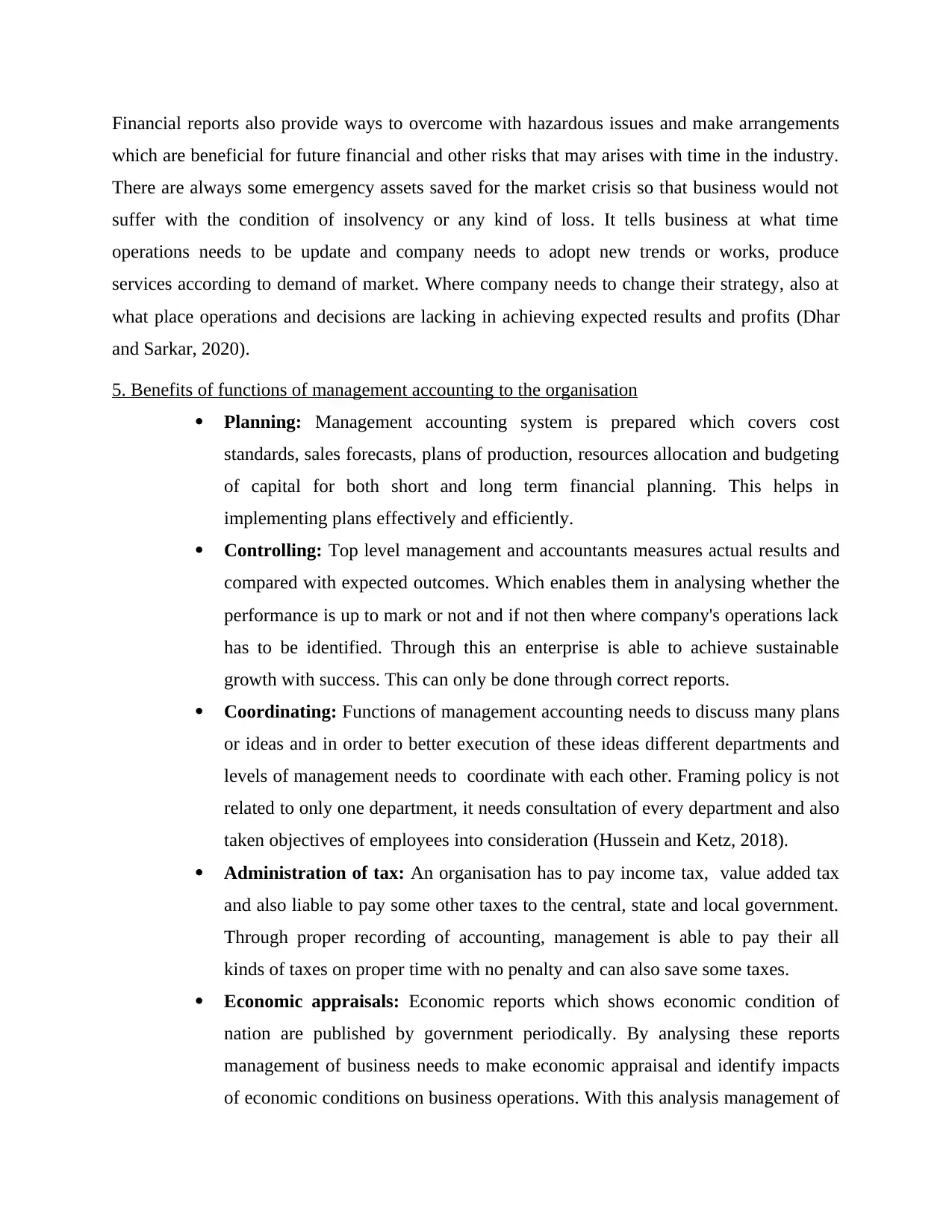
Financial reports also provide ways to overcome with hazardous issues and make arrangements
which are beneficial for future financial and other risks that may arises with time in the industry.
There are always some emergency assets saved for the market crisis so that business would not
suffer with the condition of insolvency or any kind of loss. It tells business at what time
operations needs to be update and company needs to adopt new trends or works, produce
services according to demand of market. Where company needs to change their strategy, also at
what place operations and decisions are lacking in achieving expected results and profits (Dhar
and Sarkar, 2020).
5. Benefits of functions of management accounting to the organisation
Planning: Management accounting system is prepared which covers cost
standards, sales forecasts, plans of production, resources allocation and budgeting
of capital for both short and long term financial planning. This helps in
implementing plans effectively and efficiently.
Controlling: Top level management and accountants measures actual results and
compared with expected outcomes. Which enables them in analysing whether the
performance is up to mark or not and if not then where company's operations lack
has to be identified. Through this an enterprise is able to achieve sustainable
growth with success. This can only be done through correct reports.
Coordinating: Functions of management accounting needs to discuss many plans
or ideas and in order to better execution of these ideas different departments and
levels of management needs to coordinate with each other. Framing policy is not
related to only one department, it needs consultation of every department and also
taken objectives of employees into consideration (Hussein and Ketz, 2018).
Administration of tax: An organisation has to pay income tax, value added tax
and also liable to pay some other taxes to the central, state and local government.
Through proper recording of accounting, management is able to pay their all
kinds of taxes on proper time with no penalty and can also save some taxes.
Economic appraisals: Economic reports which shows economic condition of
nation are published by government periodically. By analysing these reports
management of business needs to make economic appraisal and identify impacts
of economic conditions on business operations. With this analysis management of
which are beneficial for future financial and other risks that may arises with time in the industry.
There are always some emergency assets saved for the market crisis so that business would not
suffer with the condition of insolvency or any kind of loss. It tells business at what time
operations needs to be update and company needs to adopt new trends or works, produce
services according to demand of market. Where company needs to change their strategy, also at
what place operations and decisions are lacking in achieving expected results and profits (Dhar
and Sarkar, 2020).
5. Benefits of functions of management accounting to the organisation
Planning: Management accounting system is prepared which covers cost
standards, sales forecasts, plans of production, resources allocation and budgeting
of capital for both short and long term financial planning. This helps in
implementing plans effectively and efficiently.
Controlling: Top level management and accountants measures actual results and
compared with expected outcomes. Which enables them in analysing whether the
performance is up to mark or not and if not then where company's operations lack
has to be identified. Through this an enterprise is able to achieve sustainable
growth with success. This can only be done through correct reports.
Coordinating: Functions of management accounting needs to discuss many plans
or ideas and in order to better execution of these ideas different departments and
levels of management needs to coordinate with each other. Framing policy is not
related to only one department, it needs consultation of every department and also
taken objectives of employees into consideration (Hussein and Ketz, 2018).
Administration of tax: An organisation has to pay income tax, value added tax
and also liable to pay some other taxes to the central, state and local government.
Through proper recording of accounting, management is able to pay their all
kinds of taxes on proper time with no penalty and can also save some taxes.
Economic appraisals: Economic reports which shows economic condition of
nation are published by government periodically. By analysing these reports
management of business needs to make economic appraisal and identify impacts
of economic conditions on business operations. With this analysis management of
Paraphrase This Document
Need a fresh take? Get an instant paraphrase of this document with our AI Paraphraser
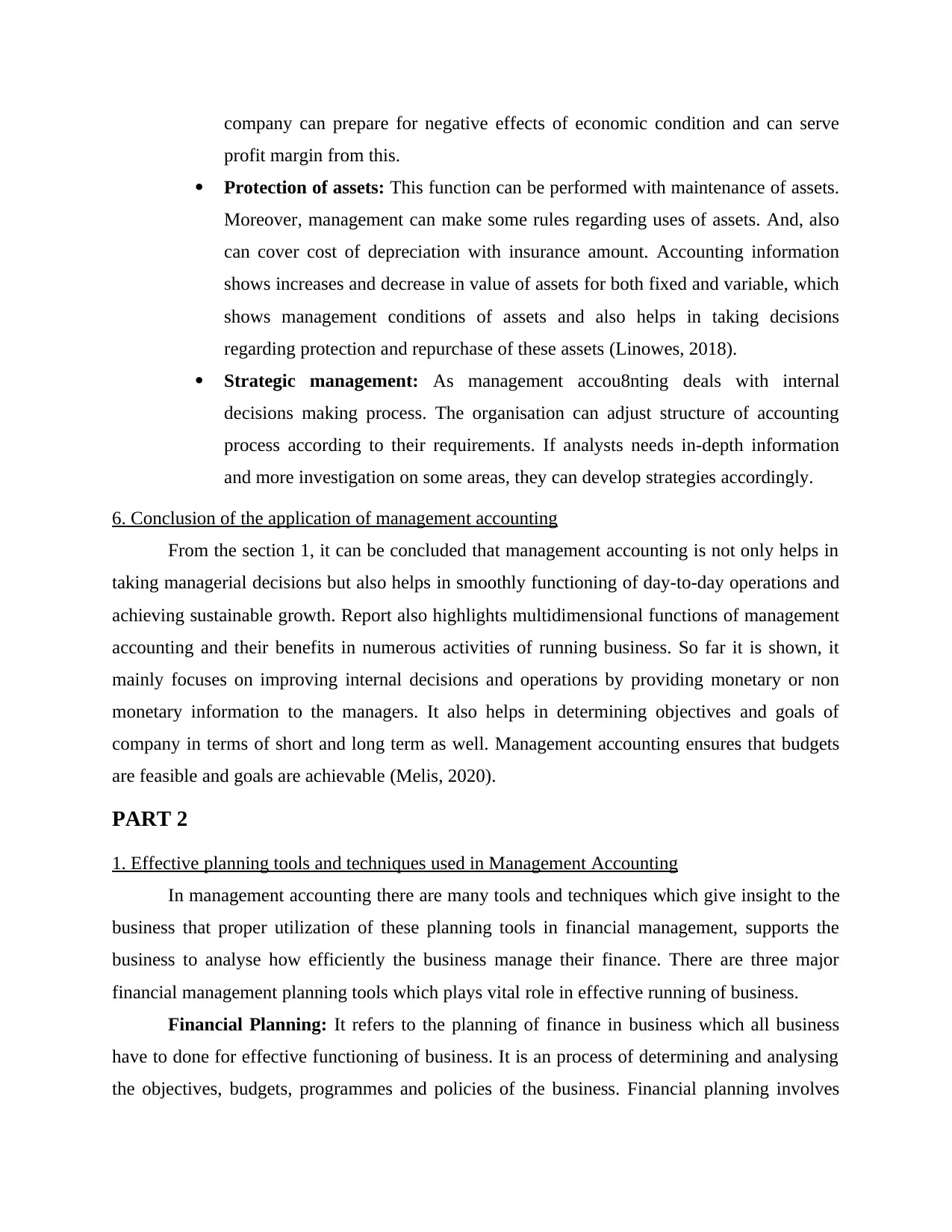
company can prepare for negative effects of economic condition and can serve
profit margin from this.
Protection of assets: This function can be performed with maintenance of assets.
Moreover, management can make some rules regarding uses of assets. And, also
can cover cost of depreciation with insurance amount. Accounting information
shows increases and decrease in value of assets for both fixed and variable, which
shows management conditions of assets and also helps in taking decisions
regarding protection and repurchase of these assets (Linowes, 2018).
Strategic management: As management accou8nting deals with internal
decisions making process. The organisation can adjust structure of accounting
process according to their requirements. If analysts needs in-depth information
and more investigation on some areas, they can develop strategies accordingly.
6. Conclusion of the application of management accounting
From the section 1, it can be concluded that management accounting is not only helps in
taking managerial decisions but also helps in smoothly functioning of day-to-day operations and
achieving sustainable growth. Report also highlights multidimensional functions of management
accounting and their benefits in numerous activities of running business. So far it is shown, it
mainly focuses on improving internal decisions and operations by providing monetary or non
monetary information to the managers. It also helps in determining objectives and goals of
company in terms of short and long term as well. Management accounting ensures that budgets
are feasible and goals are achievable (Melis, 2020).
PART 2
1. Effective planning tools and techniques used in Management Accounting
In management accounting there are many tools and techniques which give insight to the
business that proper utilization of these planning tools in financial management, supports the
business to analyse how efficiently the business manage their finance. There are three major
financial management planning tools which plays vital role in effective running of business.
Financial Planning: It refers to the planning of finance in business which all business
have to done for effective functioning of business. It is an process of determining and analysing
the objectives, budgets, programmes and policies of the business. Financial planning involves
profit margin from this.
Protection of assets: This function can be performed with maintenance of assets.
Moreover, management can make some rules regarding uses of assets. And, also
can cover cost of depreciation with insurance amount. Accounting information
shows increases and decrease in value of assets for both fixed and variable, which
shows management conditions of assets and also helps in taking decisions
regarding protection and repurchase of these assets (Linowes, 2018).
Strategic management: As management accou8nting deals with internal
decisions making process. The organisation can adjust structure of accounting
process according to their requirements. If analysts needs in-depth information
and more investigation on some areas, they can develop strategies accordingly.
6. Conclusion of the application of management accounting
From the section 1, it can be concluded that management accounting is not only helps in
taking managerial decisions but also helps in smoothly functioning of day-to-day operations and
achieving sustainable growth. Report also highlights multidimensional functions of management
accounting and their benefits in numerous activities of running business. So far it is shown, it
mainly focuses on improving internal decisions and operations by providing monetary or non
monetary information to the managers. It also helps in determining objectives and goals of
company in terms of short and long term as well. Management accounting ensures that budgets
are feasible and goals are achievable (Melis, 2020).
PART 2
1. Effective planning tools and techniques used in Management Accounting
In management accounting there are many tools and techniques which give insight to the
business that proper utilization of these planning tools in financial management, supports the
business to analyse how efficiently the business manage their finance. There are three major
financial management planning tools which plays vital role in effective running of business.
Financial Planning: It refers to the planning of finance in business which all business
have to done for effective functioning of business. It is an process of determining and analysing
the objectives, budgets, programmes and policies of the business. Financial planning involves
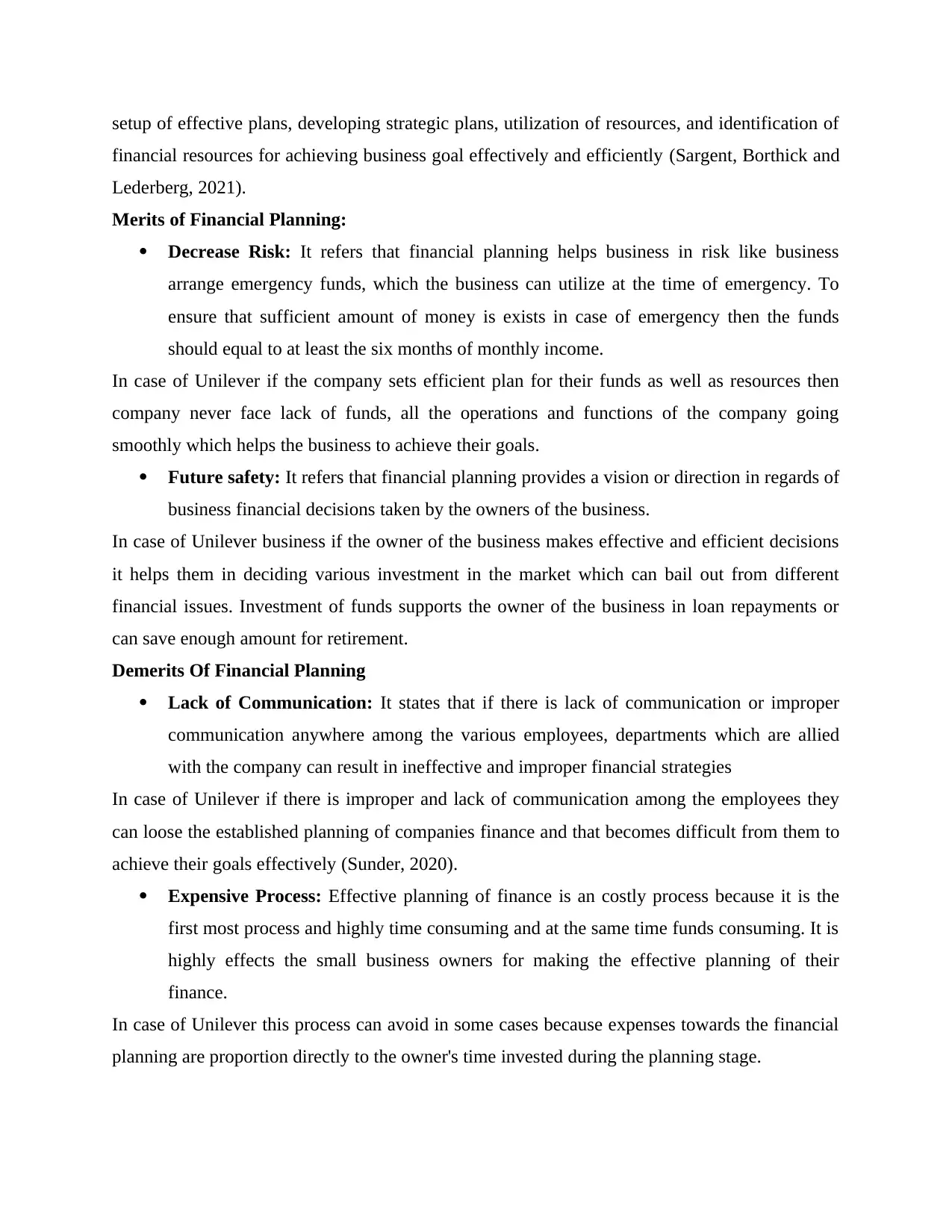
setup of effective plans, developing strategic plans, utilization of resources, and identification of
financial resources for achieving business goal effectively and efficiently (Sargent, Borthick and
Lederberg, 2021).
Merits of Financial Planning:
Decrease Risk: It refers that financial planning helps business in risk like business
arrange emergency funds, which the business can utilize at the time of emergency. To
ensure that sufficient amount of money is exists in case of emergency then the funds
should equal to at least the six months of monthly income.
In case of Unilever if the company sets efficient plan for their funds as well as resources then
company never face lack of funds, all the operations and functions of the company going
smoothly which helps the business to achieve their goals.
Future safety: It refers that financial planning provides a vision or direction in regards of
business financial decisions taken by the owners of the business.
In case of Unilever business if the owner of the business makes effective and efficient decisions
it helps them in deciding various investment in the market which can bail out from different
financial issues. Investment of funds supports the owner of the business in loan repayments or
can save enough amount for retirement.
Demerits Of Financial Planning
Lack of Communication: It states that if there is lack of communication or improper
communication anywhere among the various employees, departments which are allied
with the company can result in ineffective and improper financial strategies
In case of Unilever if there is improper and lack of communication among the employees they
can loose the established planning of companies finance and that becomes difficult from them to
achieve their goals effectively (Sunder, 2020).
Expensive Process: Effective planning of finance is an costly process because it is the
first most process and highly time consuming and at the same time funds consuming. It is
highly effects the small business owners for making the effective planning of their
finance.
In case of Unilever this process can avoid in some cases because expenses towards the financial
planning are proportion directly to the owner's time invested during the planning stage.
financial resources for achieving business goal effectively and efficiently (Sargent, Borthick and
Lederberg, 2021).
Merits of Financial Planning:
Decrease Risk: It refers that financial planning helps business in risk like business
arrange emergency funds, which the business can utilize at the time of emergency. To
ensure that sufficient amount of money is exists in case of emergency then the funds
should equal to at least the six months of monthly income.
In case of Unilever if the company sets efficient plan for their funds as well as resources then
company never face lack of funds, all the operations and functions of the company going
smoothly which helps the business to achieve their goals.
Future safety: It refers that financial planning provides a vision or direction in regards of
business financial decisions taken by the owners of the business.
In case of Unilever business if the owner of the business makes effective and efficient decisions
it helps them in deciding various investment in the market which can bail out from different
financial issues. Investment of funds supports the owner of the business in loan repayments or
can save enough amount for retirement.
Demerits Of Financial Planning
Lack of Communication: It states that if there is lack of communication or improper
communication anywhere among the various employees, departments which are allied
with the company can result in ineffective and improper financial strategies
In case of Unilever if there is improper and lack of communication among the employees they
can loose the established planning of companies finance and that becomes difficult from them to
achieve their goals effectively (Sunder, 2020).
Expensive Process: Effective planning of finance is an costly process because it is the
first most process and highly time consuming and at the same time funds consuming. It is
highly effects the small business owners for making the effective planning of their
finance.
In case of Unilever this process can avoid in some cases because expenses towards the financial
planning are proportion directly to the owner's time invested during the planning stage.
⊘ This is a preview!⊘
Do you want full access?
Subscribe today to unlock all pages.

Trusted by 1+ million students worldwide
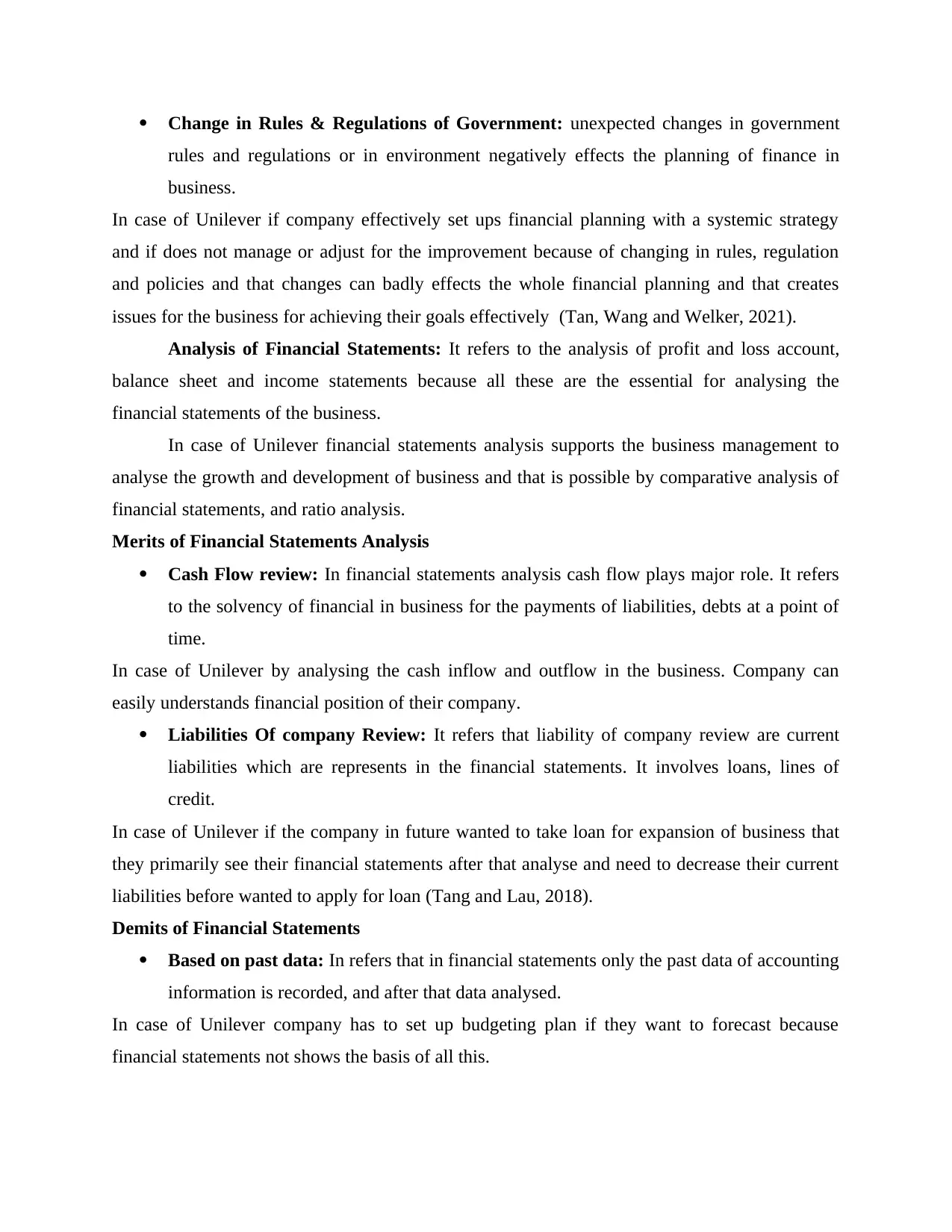
Change in Rules & Regulations of Government: unexpected changes in government
rules and regulations or in environment negatively effects the planning of finance in
business.
In case of Unilever if company effectively set ups financial planning with a systemic strategy
and if does not manage or adjust for the improvement because of changing in rules, regulation
and policies and that changes can badly effects the whole financial planning and that creates
issues for the business for achieving their goals effectively (Tan, Wang and Welker, 2021).
Analysis of Financial Statements: It refers to the analysis of profit and loss account,
balance sheet and income statements because all these are the essential for analysing the
financial statements of the business.
In case of Unilever financial statements analysis supports the business management to
analyse the growth and development of business and that is possible by comparative analysis of
financial statements, and ratio analysis.
Merits of Financial Statements Analysis
Cash Flow review: In financial statements analysis cash flow plays major role. It refers
to the solvency of financial in business for the payments of liabilities, debts at a point of
time.
In case of Unilever by analysing the cash inflow and outflow in the business. Company can
easily understands financial position of their company.
Liabilities Of company Review: It refers that liability of company review are current
liabilities which are represents in the financial statements. It involves loans, lines of
credit.
In case of Unilever if the company in future wanted to take loan for expansion of business that
they primarily see their financial statements after that analyse and need to decrease their current
liabilities before wanted to apply for loan (Tang and Lau, 2018).
Demits of Financial Statements
Based on past data: In refers that in financial statements only the past data of accounting
information is recorded, and after that data analysed.
In case of Unilever company has to set up budgeting plan if they want to forecast because
financial statements not shows the basis of all this.
rules and regulations or in environment negatively effects the planning of finance in
business.
In case of Unilever if company effectively set ups financial planning with a systemic strategy
and if does not manage or adjust for the improvement because of changing in rules, regulation
and policies and that changes can badly effects the whole financial planning and that creates
issues for the business for achieving their goals effectively (Tan, Wang and Welker, 2021).
Analysis of Financial Statements: It refers to the analysis of profit and loss account,
balance sheet and income statements because all these are the essential for analysing the
financial statements of the business.
In case of Unilever financial statements analysis supports the business management to
analyse the growth and development of business and that is possible by comparative analysis of
financial statements, and ratio analysis.
Merits of Financial Statements Analysis
Cash Flow review: In financial statements analysis cash flow plays major role. It refers
to the solvency of financial in business for the payments of liabilities, debts at a point of
time.
In case of Unilever by analysing the cash inflow and outflow in the business. Company can
easily understands financial position of their company.
Liabilities Of company Review: It refers that liability of company review are current
liabilities which are represents in the financial statements. It involves loans, lines of
credit.
In case of Unilever if the company in future wanted to take loan for expansion of business that
they primarily see their financial statements after that analyse and need to decrease their current
liabilities before wanted to apply for loan (Tang and Lau, 2018).
Demits of Financial Statements
Based on past data: In refers that in financial statements only the past data of accounting
information is recorded, and after that data analysed.
In case of Unilever company has to set up budgeting plan if they want to forecast because
financial statements not shows the basis of all this.
Paraphrase This Document
Need a fresh take? Get an instant paraphrase of this document with our AI Paraphraser
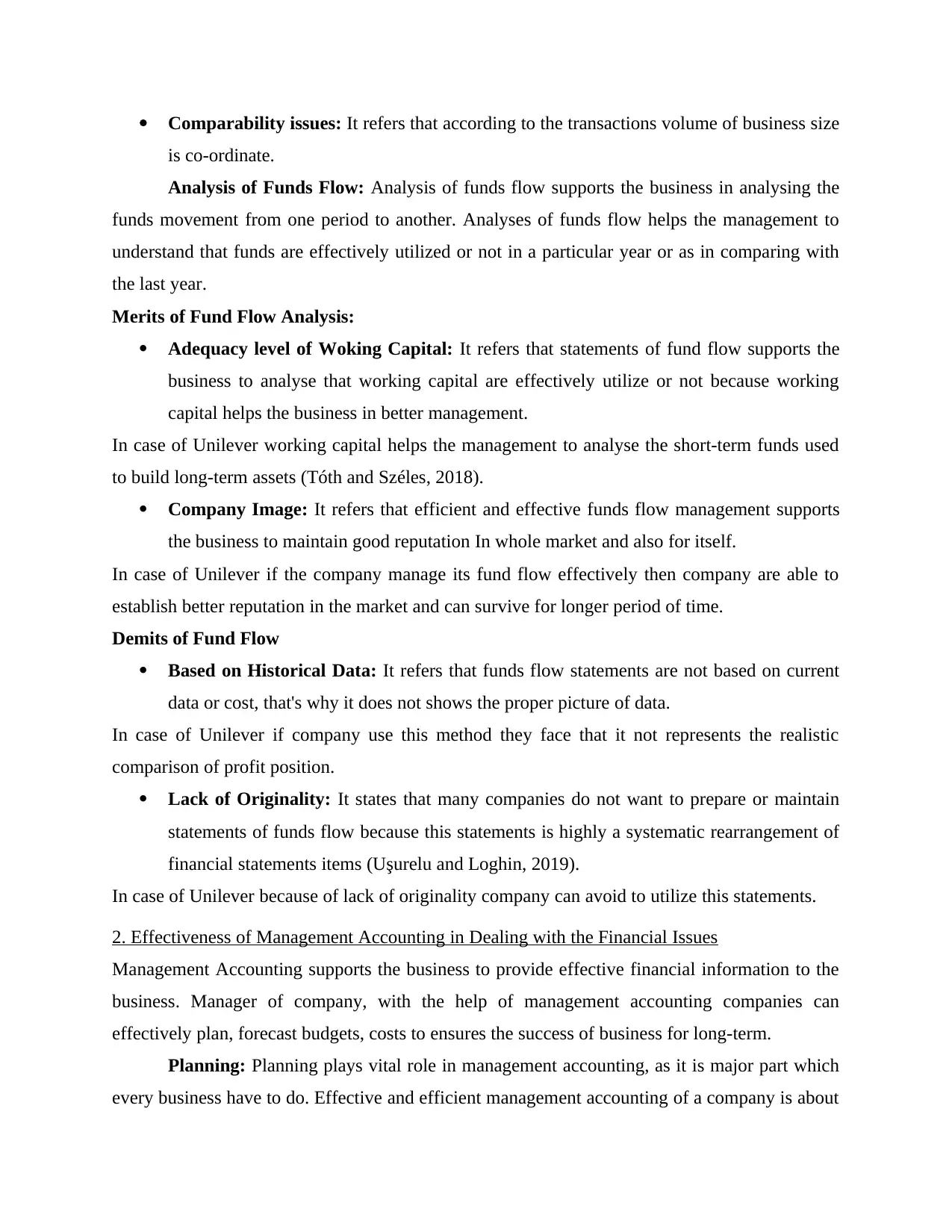
Comparability issues: It refers that according to the transactions volume of business size
is co-ordinate.
Analysis of Funds Flow: Analysis of funds flow supports the business in analysing the
funds movement from one period to another. Analyses of funds flow helps the management to
understand that funds are effectively utilized or not in a particular year or as in comparing with
the last year.
Merits of Fund Flow Analysis:
Adequacy level of Woking Capital: It refers that statements of fund flow supports the
business to analyse that working capital are effectively utilize or not because working
capital helps the business in better management.
In case of Unilever working capital helps the management to analyse the short-term funds used
to build long-term assets (Tóth and Széles, 2018).
Company Image: It refers that efficient and effective funds flow management supports
the business to maintain good reputation In whole market and also for itself.
In case of Unilever if the company manage its fund flow effectively then company are able to
establish better reputation in the market and can survive for longer period of time.
Demits of Fund Flow
Based on Historical Data: It refers that funds flow statements are not based on current
data or cost, that's why it does not shows the proper picture of data.
In case of Unilever if company use this method they face that it not represents the realistic
comparison of profit position.
Lack of Originality: It states that many companies do not want to prepare or maintain
statements of funds flow because this statements is highly a systematic rearrangement of
financial statements items (Uşurelu and Loghin, 2019).
In case of Unilever because of lack of originality company can avoid to utilize this statements.
2. Effectiveness of Management Accounting in Dealing with the Financial Issues
Management Accounting supports the business to provide effective financial information to the
business. Manager of company, with the help of management accounting companies can
effectively plan, forecast budgets, costs to ensures the success of business for long-term.
Planning: Planning plays vital role in management accounting, as it is major part which
every business have to do. Effective and efficient management accounting of a company is about
is co-ordinate.
Analysis of Funds Flow: Analysis of funds flow supports the business in analysing the
funds movement from one period to another. Analyses of funds flow helps the management to
understand that funds are effectively utilized or not in a particular year or as in comparing with
the last year.
Merits of Fund Flow Analysis:
Adequacy level of Woking Capital: It refers that statements of fund flow supports the
business to analyse that working capital are effectively utilize or not because working
capital helps the business in better management.
In case of Unilever working capital helps the management to analyse the short-term funds used
to build long-term assets (Tóth and Széles, 2018).
Company Image: It refers that efficient and effective funds flow management supports
the business to maintain good reputation In whole market and also for itself.
In case of Unilever if the company manage its fund flow effectively then company are able to
establish better reputation in the market and can survive for longer period of time.
Demits of Fund Flow
Based on Historical Data: It refers that funds flow statements are not based on current
data or cost, that's why it does not shows the proper picture of data.
In case of Unilever if company use this method they face that it not represents the realistic
comparison of profit position.
Lack of Originality: It states that many companies do not want to prepare or maintain
statements of funds flow because this statements is highly a systematic rearrangement of
financial statements items (Uşurelu and Loghin, 2019).
In case of Unilever because of lack of originality company can avoid to utilize this statements.
2. Effectiveness of Management Accounting in Dealing with the Financial Issues
Management Accounting supports the business to provide effective financial information to the
business. Manager of company, with the help of management accounting companies can
effectively plan, forecast budgets, costs to ensures the success of business for long-term.
Planning: Planning plays vital role in management accounting, as it is major part which
every business have to do. Effective and efficient management accounting of a company is about
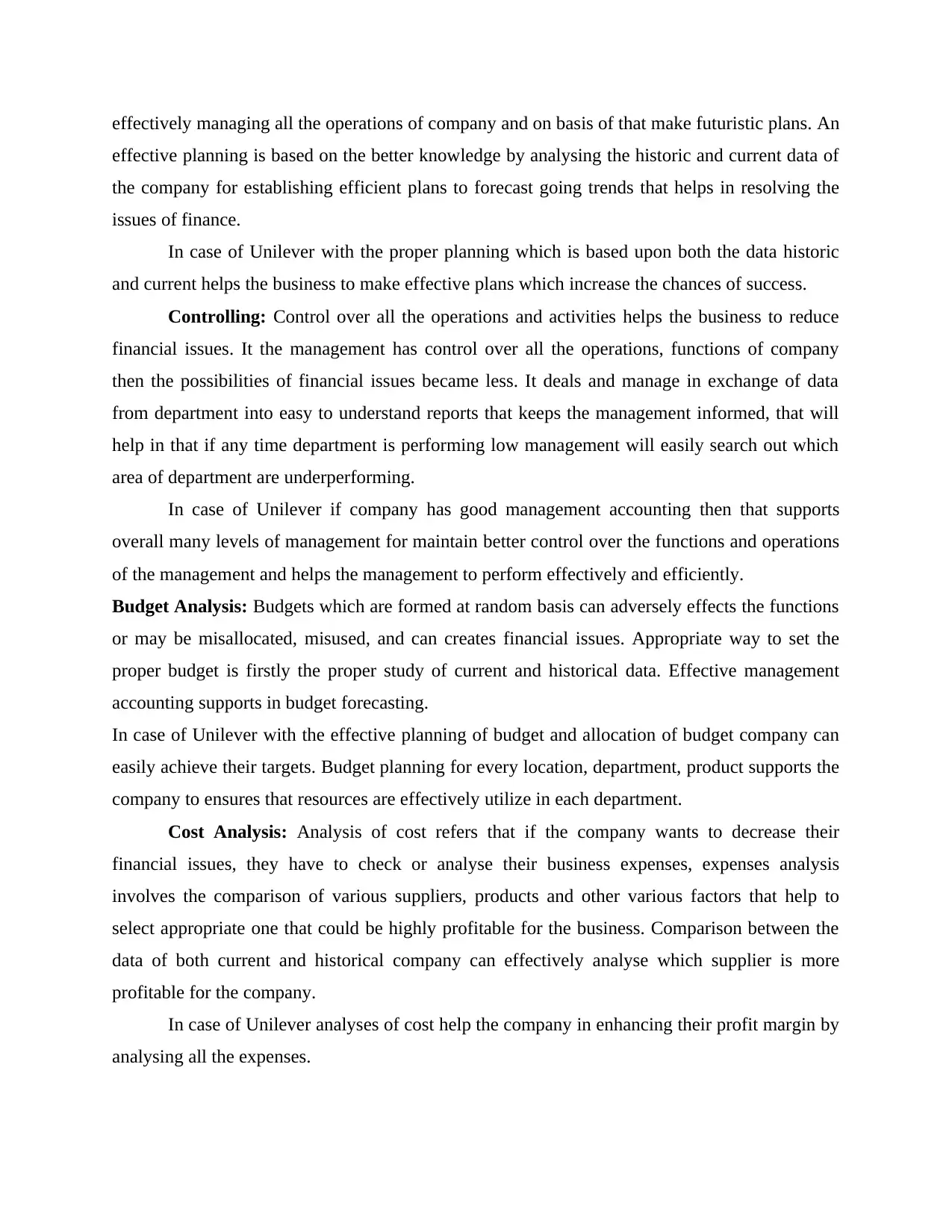
effectively managing all the operations of company and on basis of that make futuristic plans. An
effective planning is based on the better knowledge by analysing the historic and current data of
the company for establishing efficient plans to forecast going trends that helps in resolving the
issues of finance.
In case of Unilever with the proper planning which is based upon both the data historic
and current helps the business to make effective plans which increase the chances of success.
Controlling: Control over all the operations and activities helps the business to reduce
financial issues. It the management has control over all the operations, functions of company
then the possibilities of financial issues became less. It deals and manage in exchange of data
from department into easy to understand reports that keeps the management informed, that will
help in that if any time department is performing low management will easily search out which
area of department are underperforming.
In case of Unilever if company has good management accounting then that supports
overall many levels of management for maintain better control over the functions and operations
of the management and helps the management to perform effectively and efficiently.
Budget Analysis: Budgets which are formed at random basis can adversely effects the functions
or may be misallocated, misused, and can creates financial issues. Appropriate way to set the
proper budget is firstly the proper study of current and historical data. Effective management
accounting supports in budget forecasting.
In case of Unilever with the effective planning of budget and allocation of budget company can
easily achieve their targets. Budget planning for every location, department, product supports the
company to ensures that resources are effectively utilize in each department.
Cost Analysis: Analysis of cost refers that if the company wants to decrease their
financial issues, they have to check or analyse their business expenses, expenses analysis
involves the comparison of various suppliers, products and other various factors that help to
select appropriate one that could be highly profitable for the business. Comparison between the
data of both current and historical company can effectively analyse which supplier is more
profitable for the company.
In case of Unilever analyses of cost help the company in enhancing their profit margin by
analysing all the expenses.
effective planning is based on the better knowledge by analysing the historic and current data of
the company for establishing efficient plans to forecast going trends that helps in resolving the
issues of finance.
In case of Unilever with the proper planning which is based upon both the data historic
and current helps the business to make effective plans which increase the chances of success.
Controlling: Control over all the operations and activities helps the business to reduce
financial issues. It the management has control over all the operations, functions of company
then the possibilities of financial issues became less. It deals and manage in exchange of data
from department into easy to understand reports that keeps the management informed, that will
help in that if any time department is performing low management will easily search out which
area of department are underperforming.
In case of Unilever if company has good management accounting then that supports
overall many levels of management for maintain better control over the functions and operations
of the management and helps the management to perform effectively and efficiently.
Budget Analysis: Budgets which are formed at random basis can adversely effects the functions
or may be misallocated, misused, and can creates financial issues. Appropriate way to set the
proper budget is firstly the proper study of current and historical data. Effective management
accounting supports in budget forecasting.
In case of Unilever with the effective planning of budget and allocation of budget company can
easily achieve their targets. Budget planning for every location, department, product supports the
company to ensures that resources are effectively utilize in each department.
Cost Analysis: Analysis of cost refers that if the company wants to decrease their
financial issues, they have to check or analyse their business expenses, expenses analysis
involves the comparison of various suppliers, products and other various factors that help to
select appropriate one that could be highly profitable for the business. Comparison between the
data of both current and historical company can effectively analyse which supplier is more
profitable for the company.
In case of Unilever analyses of cost help the company in enhancing their profit margin by
analysing all the expenses.
⊘ This is a preview!⊘
Do you want full access?
Subscribe today to unlock all pages.

Trusted by 1+ million students worldwide
1 out of 14
Related Documents
Your All-in-One AI-Powered Toolkit for Academic Success.
+13062052269
info@desklib.com
Available 24*7 on WhatsApp / Email
![[object Object]](/_next/static/media/star-bottom.7253800d.svg)
Unlock your academic potential
Copyright © 2020–2026 A2Z Services. All Rights Reserved. Developed and managed by ZUCOL.




